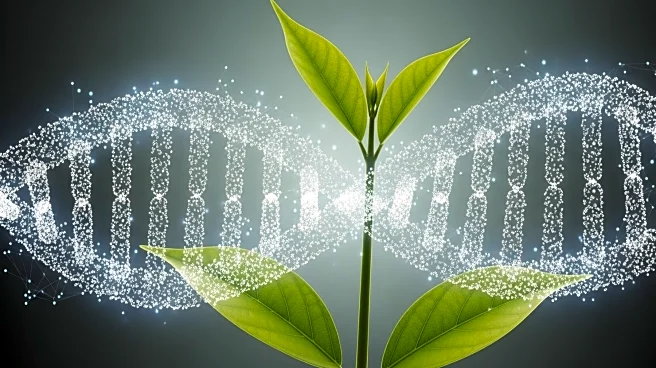What is the story about?
What's Happening?
In a recent episode of BusinessLine’s Agrispective, Dr. RS Paroda, former Director General of the Indian Council of Agricultural Research (ICAR), discussed the transformative potential of gene editing in agriculture. The conversation focused on CRISPR-Cas technology, which allows for precise modifications to crop DNA to enhance traits such as drought tolerance, pest resistance, and nutrient content. This method of gene editing accelerates crop improvement without introducing foreign genes, offering a significant advantage in addressing agricultural challenges like climate change and soil health. The episode also highlighted India's regulatory framework for gene editing, which aims to foster innovation while ensuring safety. Dr. Paroda stressed the importance of public awareness and science-backed communication to alleviate concerns about gene-edited crops.
Why It's Important?
The application of CRISPR technology in agriculture holds significant implications for the industry, particularly in enhancing food security and sustainability. By enabling precise genetic modifications, CRISPR can help develop crops that are more resilient to environmental stresses, thereby potentially increasing agricultural productivity and reducing dependency on chemical inputs. This is crucial for addressing the challenges posed by climate change and ensuring a stable food supply. Moreover, the regulatory support in India for gene editing could serve as a model for other countries, promoting global advancements in agricultural biotechnology. The technology's ability to improve crop yields and nutritional content could have far-reaching effects on public health and economic stability, benefiting farmers, consumers, and the agricultural sector at large.
What's Next?
As CRISPR technology continues to evolve, its integration into mainstream agricultural practices is likely to increase. Future developments may include more comprehensive regulatory frameworks that balance innovation with safety, as well as increased public engagement to build trust in gene-edited products. Researchers and policymakers may focus on expanding the range of crops that can benefit from gene editing, potentially leading to breakthroughs in food security and environmental sustainability. Additionally, international collaboration could enhance the sharing of knowledge and resources, further accelerating the adoption of CRISPR in agriculture.
Beyond the Headlines
The ethical and cultural dimensions of gene editing in agriculture are significant. Public perception and acceptance of gene-edited crops will play a crucial role in their adoption. Ethical considerations regarding the manipulation of genetic material and the potential impact on biodiversity must be addressed. Furthermore, the technology could lead to shifts in agricultural practices, potentially affecting traditional farming communities and prompting discussions on the equitable distribution of benefits. Long-term, CRISPR could redefine agricultural norms and practices, influencing global food systems and policies.















